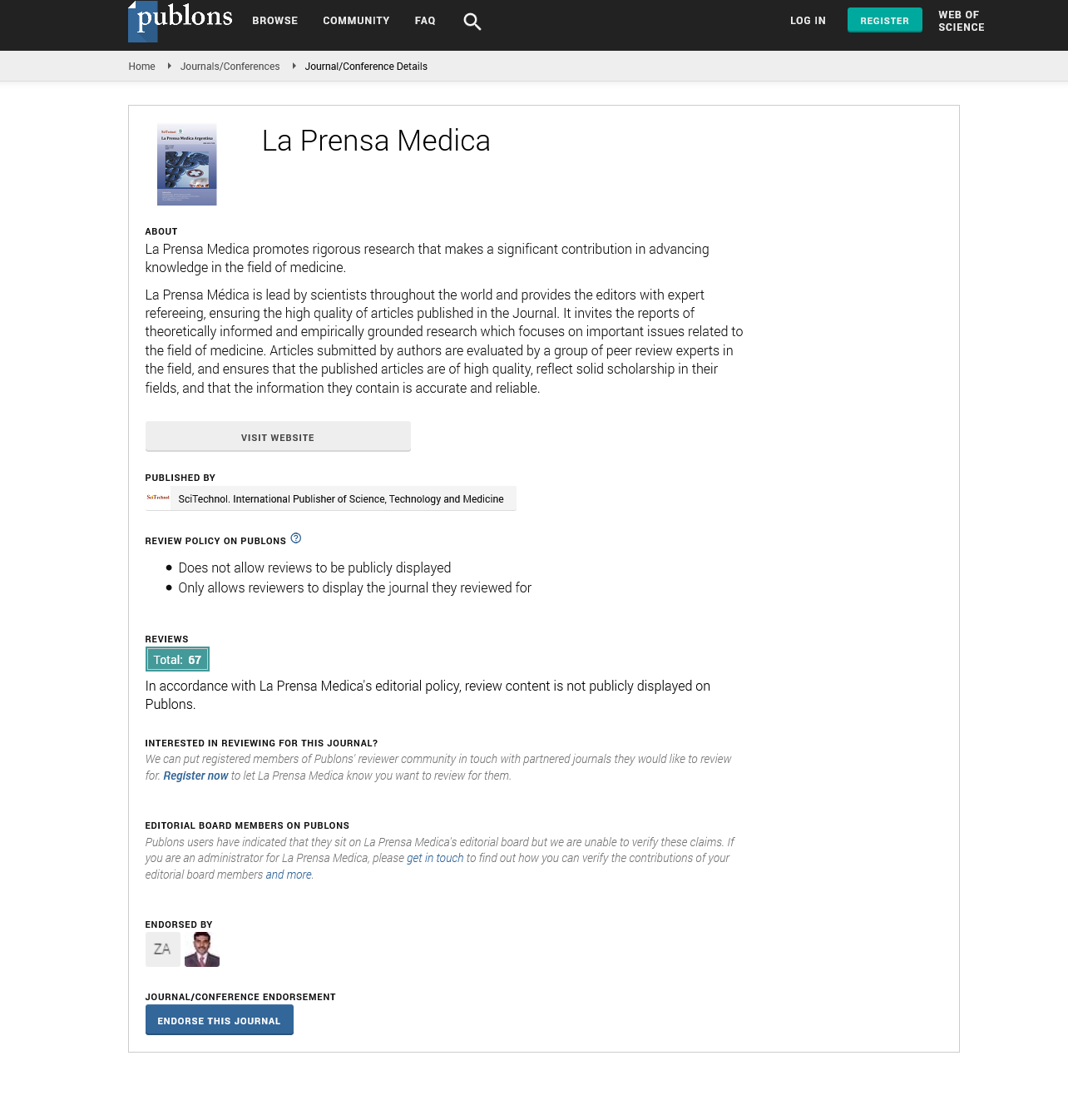Commentary, La Prensa Medica Vol: 109 Issue: 3
Targeting the Gut Microbiota for Renal Wellness: Implications of the Gut-Kidney Axis
Diogo de Pinho*
Department of Physiology and Pharmacology, School of Medicine, Federal University of Ceara, Fortaleza, Brazil
*Corresponding Author: Diogo de Pinho
Department of Physiology and
Pharmacology, School of Medicine, Federal University of Ceara, Fortaleza, Brazil;
E-mail: depinho@unicentro.br
Received date: 29 May, 2023, Manuscript No. LPMA-23-107115;
Editor assigned date: 31 May, 2023, PreQC No. LPMA-23-107115 (PQ);
Reviewed date: 15 June, 2023, QC No. LPMA-23-107115;
Revised date: 22 June, 2023, Manuscript No. LPMA-23-107115 (R);
Published date: 29 June, 2023, DOI: 10.4172/0032-745X.1000168
Citation: de Pinho D (2023) Targeting the Gut Microbiota for Renal Wellness: Implications of the Gut-Kidney Axis. La Prensa Medica 109:3.
Abstract
Description
The gut and kidneys are two distinct organs with essential functions in the human body. However, emerging research has highlighted a close connection between these organs through the gut-kidney axis. The gut microbiota, composed of trillions of microorganisms residing in the gastrointestinal tract, and the immune system play pivotal roles in maintaining renal health. This article explores the intricate relationship between the gut microbiota, immune system, and their influence on renal health, shedding light on the underlying mechanisms and potential implications for disease prevention and management.
The gut microbiota and kidney health
The gut microbiota plays a pivotal role in maintaining homeostasis and influencing various physiological processes, including metabolism, immunity, and inflammation. Recent studies have unveiled its impact on kidney health. The gut microbiota contributes to the metabolism of dietary compounds, such as polyphenols and fiber, generating metabolites with potential renal benefits. Additionally, gut microbial dysbiosis, characterized by alterations in microbial composition and function, has been associated with the development and progression of kidney diseases, including Chronic Kidney Disease (CKD), Acute Kidney Injury (AKI), and diabetic nephropathy.
Immune system modulation by the gut microbiota
The gut microbiota plays a pivotal role in educating and modulating the immune system. Gut microorganisms interact with immune cells in the Gut-Associated Lymphoid Tissue (GALT), such as dendritic cells, macrophages, and T cells, influencing immune responses locally and systemically. The gut microbiota promotes immune tolerance, shaping the immune system's ability to recognize self from non-self and preventing aberrant immune activation. Dysbiosis of the gut microbiota can disrupt this delicate balance, leading to immune dysregulation and chronic inflammation, which may contribute to the development and progression of renal diseases.
Influence of gut microbiota-derived metabolites on renal health
The gut microbiota produces a vast array of metabolites that can directly or indirectly impact renal health. Short-Chain Fatty acids (SCFAs), such as acetate, propionate, and butyrate, are byproducts of microbial fermentation of dietary fiber. SCFAs have been shown to exert anti-inflammatory effects, improve gut barrier function, and modulate renal hemodynamics. Other gut microbiota-derived metabolites, such as Trimethylamine N-oxide (TMAO) and indoxyl sulfate, have been implicated in renal injury and the progression of CKD. Understanding the role of these metabolites in renal health can provide valuable insights into the gut-kidney axis.
Pharmacogenomics and individualized drug response
Pharmacogenomics is a field that investigates how genetic variations influence an individual's response to medications. By analyzing genetic variants that affect drug metabolism, efficacy, or adverse reactions, pharmacogenomics helps optimize drug selection and dosing. In gastroenterology, pharmacogenomics testing can inform the use of medications such as thiopurines or anti-TNF agents in IBD, where certain genetic variants can predict treatment response or risk of adverse events. This personalized approach minimizes trial-and-error in medication selection and reduces the likelihood of unnecessary side effects.
Impact of the gut microbiota on renal inflammation and fibrosis
Chronic inflammation and renal fibrosis are common features of progressive kidney diseases. The gut microbiota has been linked to the regulation of inflammation and fibrosis in the kidneys. Dysbiosis-induced gut permeability allows the translocation of microbial products, such as lipopolysaccharides, into the bloodstream, triggering systemic inflammation. This systemic inflammation can contribute to renal inflammation and fibrosis through immune cell activation, cytokine release, and oxidative stress. Modulating the gut microbiota to restore intestinal barrier function and reduce systemic inflammation holds potential for mitigating renal inflammation and fibrosis.
Therapeutic potential of gut microbiota modulation in renal diseases
Targeting the gut microbiota as a therapeutic approach to renal diseases has gained attention. Probiotics, prebiotics, and postbiotics are interventions aimed at modulating the gut microbiota composition and function. Probiotics, live microorganisms with potential health benefits, have shown efficiency in reducing proteinuria, inflammation, and oxidative stress in experimental models of renal diseases. Prebiotics, non-digestible fibers that selectively promote the growth of beneficial gut bacteria, offer potential protective effects against renal injury. Postbiotics, the bioactive compounds produced by the gut microbiota, exhibit anti-inflammatory, antioxidant, and immuno-modulatory properties. Modulating the gut microbiota through these interventions holds possibility for ameliorating renal diseases, although further research is needed to establish their efficacy and safety in clinical settings.
Conclusion
The gut-kidney axis represents a fascinating and intricate connection between the gut microbiota, immune system, and renal health. The gut microbiota influences renal health through its metabolites, modulation of immune responses, and effects on inflammation and fibrosis. Understanding the complex interactions within the gut-kidney axis can pave the way for novel therapeutic strategies in the prevention and management of renal diseases. Further research is needed to unravel the specific mechanisms and explore the potential of interventions that target the gut microbiota to improve renal health and patient outcomes.
 Spanish
Spanish  Chinese
Chinese  Russian
Russian  German
German  French
French  Japanese
Japanese  Portuguese
Portuguese  Hindi
Hindi 

